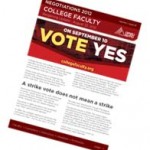See the original article at collegefaculty.org
Download the PDF of this bulletin for printing or sharing: Bargaining Update – August 22
College faculty and college students are naturally concerned about the upcoming strike vote so early in the school year. Many may be wondering: How has it come to this?
Strike votes are normal in college faculty bargaining. Strikes, however, are rare. Few rounds of bargaining are resolved without a strike vote first. One of the reasons for this is that management wants to test the resolve of the faculty to back the changes faculty want made to the Collective Agreement. If faculty demonstrate their resolve through a positive strike vote, management is less willing to risk a strike. That is why by far the most common result of a strike vote is a negotiated settlement.
A strike vote does not mean a strike
Nine times following a strike vote, there was no strike. Some issues are so contentious or so costly that resolution cannot be achieved without a strike. The effects of a strike, however, are not always negative.
The strike in 1984 resulted in the workload formula and the subsequent hiring of over 1000 new full-time teachers.
In 1989, the colleges wanted to eliminate the cumulative sick leave plan and the payout for unused sick days. The faculty went on strike. The plan was maintained, though the payout provision was eliminated for future employees.
The faculty struck in 2006. The issues again revolved around workload and quality education. The gain made lies in the recommendations of the workload task force. In particular, the task force called for greater academic control in the hands of the faculty. The gains have not yet been realized as the colleges imposed terms and conditions in 2009 which did not include the recommendations.
Other than in those three instances, settlements were reached.
Timely settlement is the goal
This time the faculty have taken a more accelerated approach to negotiations. That is why the vote is coming earlier than in the past.
The faculty bargaining team has shifted strategies to move time-lines forward based on feedback from the last round, and in consideration of the imposition used last round. However, we cannot control management’s approach to bargaining. The resolve of the membership to have their issues addressed is a critical factor at this point in negotiations.
The purpose of the strike vote is to give management another good reason to settle. It is the way for faculty to tell the colleges that they do want improvements to the way we deliver programs and courses. A strike vote puts pressure on both sides to forge a deal that is acceptable to both parties.
Your vote in favour of strike authorization is an important step to reaching a fair settlement.
On September 10, vote YES for a strong strike mandate.
What you can do right now
- Print out your bulletin and share it with your colleagues.
- Be prepared to answer questions about negotiations. You can support bargaining by providing positive and informed answers to questions among your colleagues and in the classroom.
- Visit the negotiations website for more information at www.collegefaculty.org
- Join the Ontario College Faculty Facebook page for ongoing updates.
Your bargaining team
•• Carolyn Gaunt, Cambrian College (Co-Chair)
•• Ted Montgomery, Seneca College (Co-Chair)
•• Rod Bain, Algonquin College
•• Gary Bonczak, Fleming College
•• Benoît Dupuis, La Cité collégiale
•• Lynn Dee Eason, Sault College
•• JP Hornick, George Brown College
Contact your team:
negotiations2012@gmail.com
Follow us on Twitter at @CAATA2012
Join the Facebook page at http://www.facebook.com/#!/OntarioCollegeFaculty
COLLEGE FACULTY EXPERTS IN
STUDENT SUCCESS SINCE 1967
